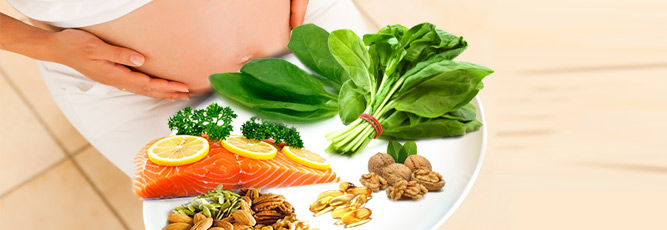Healthy diet and pregnancy go hand in hand. Every pregnant woman needs increased amounts of proteins, vitamins and minerals, and calories for a healthy baby. If you are confused about what comprises of a healthy diet for both you and your baby, then consult a nutritionist. The aim is to take in extra 300 calories in a day.
The primary thing to take into consideration is to eat different types of foods. Let’s discuss a few foods/food groups, which may be beneficial for you.
-
- Fruits and vegetables: They make up the main source of all essentials vitamins and nutrients needed especially Vitamin C and folic acid. During pregnancy, you should consume at least 70 mg of vitamin C daily. The source of Vitamin C rich foods mainly includes oranges, tomatoes, and broccoli. 0.4 mg of folic acid per day is recommended. Good sources include green leafy vegetables.
- Proteins: The developing baby needs a lot of protein, especially during the second and third trimester. Meat, eggs, fish, beans are not only rich in proteins but also provide iron. Also, consuming proteins increase the supply of oxygen to the baby, and relieves your symptoms of fatigue, irritability and depression.
- Bread and grains: Carbohydrates are the main energy sources during pregnancy. Whole grains offer iron, fibre and certain amount of Vitamin B.
Always take care:
- To wash the fruits and vegetables before eating
- Prepare food in clean utensils
- Store raw foods away from the ready-to-eat foods
- Cook foods thoroughly
According to health experts a healthy diet must consist of:
- Proteins, such as
- 2-3 serving of meat: fully cooked meat or fish, liver, chicken, lamb etc.
- 1 serving of nuts
- 1 serving of tofu
- 2-3 servings of legumes: Split peas, kidney or black beans, chick peas
- Calcium: Daily requirement is 1000 mg during pregnancy. It is essential for the formation of healthy bones and teeth. Examples may include:
- 3-4 servings of dairy: milk, eggs, yogurt, tofu, pasteurized cheese
- White beans
- 1 serving of almonds
- 1 serving of salmon
- Iron: Iron along with sodium, potassium and water helps in increasing blood volume, thereby preventing the risk of anemia. 27 mg is the recommended dietary intake during pregnancy. Examples may include:
- 2-3 servings of green leafy vegetables: spinach, lettuce, cabbage
- 3 servings of whole grains: bread, oatmeal
- 2-3 servings of lean protein: seafood, poultry
- Folic Acid: Essential to prevent the neural tube defects in the foetus. 600 to 800 micrograms of folic acid intake is recommended everyday during pregnancy. Examples may include:
- 2 servings of dark green leafy vegetables: spinach, lettuce, cabbage
- 2-3 servings of fruits: orange, strawberry, mango, lemon, tomatoes, kiwi, melon
- 3 servings of whole grains: bread, corn, oatmeal
- 2 servings of legumes: red and white kidney beans, black beans, chick peas
- Vitamin C: Essential for the metabolic processes, and bone and teeth development in the baby. Examples may include:
- 3 servings of fruits: orange, strawberry, mango, lemon, tomatoes, kiwi, melon
To conclude, don’t diet during pregnancy and always aim on gaining healthy weight. Consult your nutritionist if you are confused regarding your dietary intake during pregnancy.

